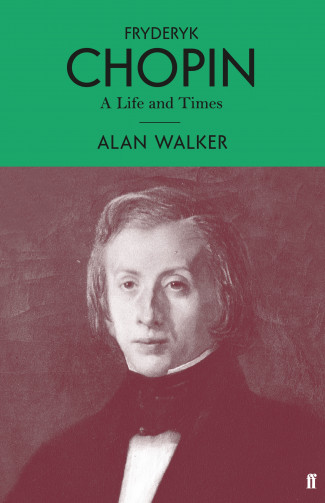Fryderyk Chopin: A Life and Times
By Alan Walker
Faber £30.00 727 pp
Farrar Strauss & Giroux $40.00
There have been many biographies of Chopin, and countless studies of his works, but this is the book we have been waiting for: a magisterial account of the life and its extension into the music, drawing on all the latest scholarship. The familiar phases of Chopin’s adult life are nicely covered: the fleeting idyll with the family of Konstancja Gladkowska (who was the inspiration for the F minor concerto’s Larghetto); the miserable entanglement with Maria Wodzinska; the disastrous Majorca sojourn, and its equally disastrous sequel at Nohant; the farewell trip to Britain. But Walker has wisely set these episodes – about which there is nothing new to say – in a context which puts elements of the story which are usually glossed over into illuminating relief.
First and foremost, he shows how tuberculosis pervaded society at large in Chopin’s day, as well as how it blighted his life: at seventeen, infected himself, he had to watch his beloved younger sister Emilia cough her life out. Yet it’s impossible to imagine a happier family than that of Nicolas Chopin, Tekla Justyna Krzyzanowska and their children, in the early days. The parents were cultivated and musical, and Fryderyk and his three sisters combined musical talent with precocious literary sophistication; the mutual devotion between parents and offspring never wavered. Fryderyk was educated alongside Poland’s young intelligentsia, several of whom boarded with the Chopin family and remained lifelong friends of the composer. Chopin was also blessed with a piano teacher, Wojciech Zywny – the only teacher he ever had – who gave him six years of excellent tuition; it’s interesting that one of Chopin’s first jobs was as a church organist, and it’s also worth noting that he was a gifted satirist and mimic.
Walker makes clear how heavily the Russian yoke weighed on the long-suffering Poles, with alternating periods of routine oppression and large-scale massacres; Chopin, he argues, was (despite some biographers’ assertions) a passionate patriot, and became a leading figure in the Polish diaspora which settled in Paris in the 1830s. Chopin’s letters paint a vivid picture of that city’s gamey anarchy, and of its ravaging by cholera with the streets gridlocked by carts laden with corpses.
Walker is good on the glittering throng of writers, painters, and musicians forming the society in which Chopin moved, and on the shifting styles of pianism, with the stile brillante personified by Hummel (who Chopin admired and liked) giving way, under Chopin’s influence, to something fresher and more poetic. Heine’s withering put-down of the preening Kalkbrenner’s playing – ‘like a bonbon fallen in the mud, there’s nothing wrong with it, but everybody leaves it where it lies’ – being typical of the no-holds-barred criticism of the day.
We get all the usual plaudits for Chopin’s own performances, plus some less familiar details which set those performances in perspective. Here is Chopin’s staunch admirer Sir Charles Hallé, who on first hearing him was left speechless: ‘The marvellous charm, the poetry and originality, the perfect freedom and absolute lucidity of Chopin’s playing cannot be described… I could have dropped on my knees to worship him.’ Yet here was the composer confiding to Liszt: ‘I am not fitted to give concerts, the public frightens me. I feel suffocated by its panting breath, paralyzed by its curious glance, mute before those unknown faces.’ One of the myths which Walker destroys is that of the ‘close friendship’ between Chopin and Liszt, whom Chopin considered hopelessly flashy. Another myth which this book implicitly despatches is the notion that Chopin gave only twenty recitals in his life: if you count in his salon performances, the tally is in the hundreds.
Walker’s commentaries on the music itself are adroit and illuminating, as is his account of Chopin’s approach to the keyboard; he itemises the great unpublished works which Chopin’s sister Ludwika disobediently saved from the flames to which the dying composer had consigned them. He prefaces his final chapter with the grim words of Chopin’s friend Wojciech Grzymala: ‘His life did not withdraw slowly, it fled from him.’ And he quotes Chopin’s long-standing supporter the Marquis de Custine in a lovely epitaph: ‘You have transformed a public into a circle of friends. One is alone with you in the midst of a crowd: it is not a piano that speaks, but a soul.’
